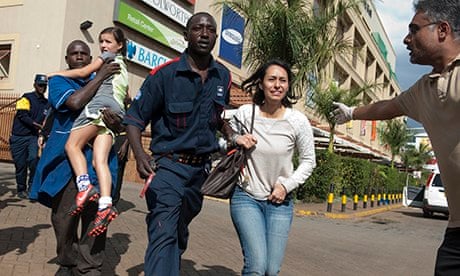It was difficult to read Giles Foden's article squarely blaming the attack on the Westgate mall in Nairobi on alleged inadequacies of the Kenyan government and, as he puts it "rampant corruption" (Behind terror is corruption, 24 September). The Kenyan military led the operation to free hostages and kill or capture those who had trapped them, and we are proud of the professionalism and determination of our forces.
Foden says: "In Kenya crime and terrorism are deeply linked, not least by the failure of successive Kenyan governments to control either." And he continues: "These attacks are part of a spectrum of banditry, with corruption at one end, terrorism at the other, and regular robbery in the middle."
Make a brief comparison with other terrorist attacks. The disasters of 9/11 or the more recent Boston marathon in the US and 7/7 in the UK – both highly developed countries – could hardly be blamed on corruption, so why Kenya? We do not recall Foden blaming corruption within the security agencies involved.
"A lot of money has gone into commercial property, and particularly the building of supermarkets. But without governance it all looks very shaky," says Foden. But he seems unaware of how much Kenya has changed in the past decade. The country's first truly free and fair multiparty election only took place in 2002, and since then the country has been transformed by a new constitution that gives power to all communities. Less than 10 years ago we introduced free primary education, now over a million children a year go to school.
Judicial reform, in some cases supported by international experts and donors – including the US and UK – has put the courts out of the political influence that once was common. Anti-corruption campaigns by government and civil society, the requirement for open tenders for government contracts, and the development of a lively media, have transformed the country.
This is not to say Kenya is perfect – far from it. A multinational forensic investigation currently under way – including with British agents – will examine the tragedy and assess the government's response to it. It shows the extent of our openness that we allow foreign security forces to share in an investigation we could probably manage ourselves.
At the same time, we will strive to be as open as possible in our actions against al-Qaida and its regional ally al-Shabaab in the coming months, without compromising the security of our country and the safety of our military personnel.
It is important that there is responsible international reporting. In this age of budget cuts in the international media there are too few foreign journalists with expert experience of Africa living in and reporting from the continent. Kenya suffered a terrible tragedy at Westgate. As information is released in the coming days and weeks, it is crucial – for the sake of the victims and the survivors – that reporting reflects the Kenya of today, and that we are judged by today's reality, not memories of a Kenya past.
